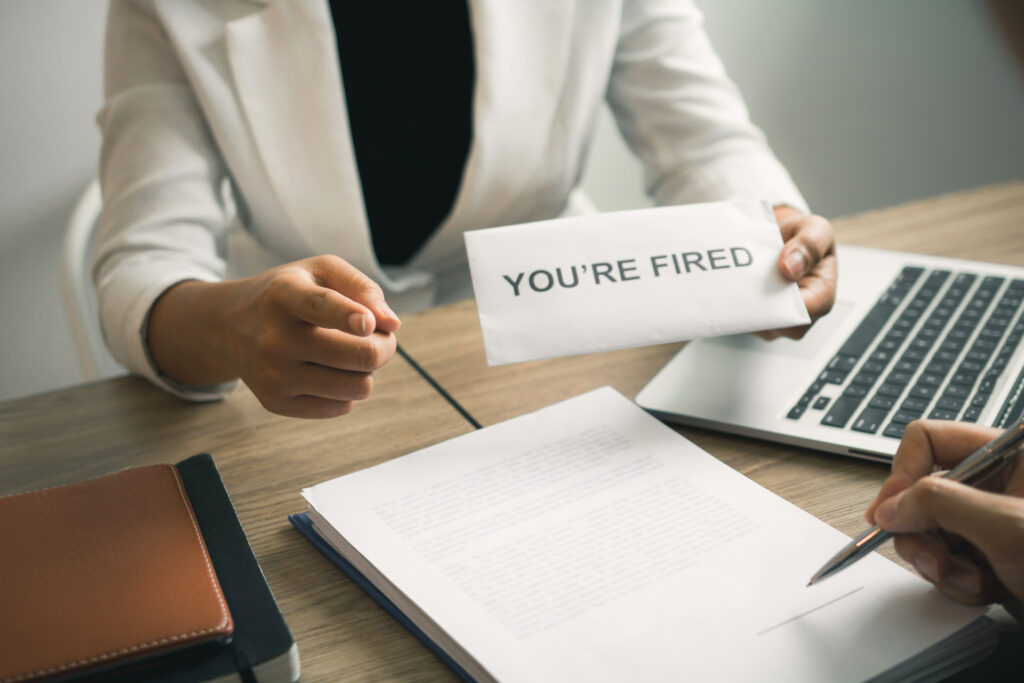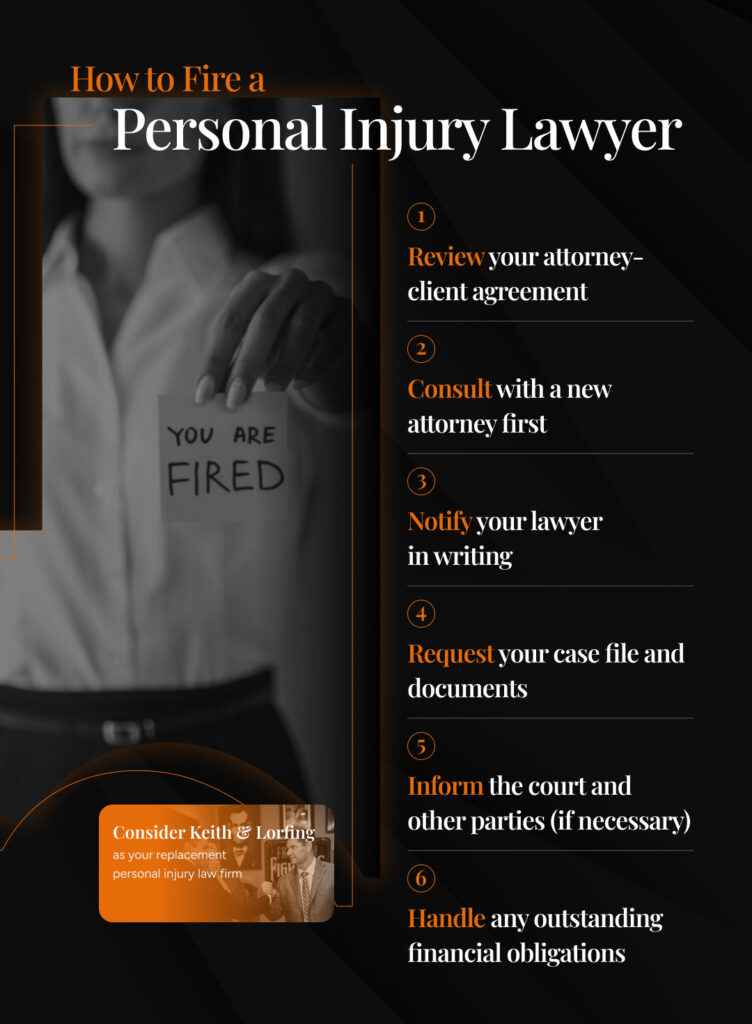Yes, you have the right to fire your personal injury lawyer in Texas at any time. If you’re unhappy with their communication, case progress, or commitment to securing the best outcome, switching attorneys may be the best decision. Your case—and your financial future—deserves strong, dedicated representation.
But waiting too long to make a change could hurt your case. If your lawyer is missing deadlines, pressuring you into a low settlement, or failing to fight for you, your compensation could suffer.
Insurance companies take advantage of weak representation, and legal missteps could delay or even jeopardize your claim. If you don’t act now, you may settle for far less than you deserve—or worse, walk away with nothing.

At Keith & Lorfing, we know how frustrating it is to feel stuck with a lawyer who isn’t giving your case the attention it needs—speak with our Abilene personal injury lawyer today.
Find out moreCan you fire an injury lawyer during trial or litigation?
Yes, you can fire your personal injury lawyer at any stage of your case, including during trial or litigation. Texas law allows clients to change attorneys if they are dissatisfied with their legal representation. However, doing so mid-litigation may have consequences, including potential delays, additional costs, and challenges in finding a new lawyer willing to take over the case.
If you decide to switch attorneys, it’s important to review your contract for any fees owed and ensure a smooth transition to new counsel. If you’re considering making a change, our team can help you understand the best course of action for your case.
Can I fire my personal injury attorney and represent myself?
Yes, you have the right to fire your personal injury attorney and handle your case on your own. However, personal injury claims can be complex, and representing yourself may put you at a disadvantage, especially when negotiating with insurance companies or presenting evidence in court.
- Legal knowledge is vital – Personal injury law involves procedural rules, legal filings, and deadlines. Missing a requirement could harm your case.
- Insurance companies may take advantage – Insurers know that self-represented individuals often lack negotiation skills. They may offer low settlements or deny claims outright.
- Proving liability and damages is challenging – Gathering medical records, expert testimony, and accident reports requires experience. Our lawyers have the experience to build a stronger case and fight for the compensation you deserve.
- Court procedures can be overwhelming – If your case goes to trial, you’ll need to follow strict courtroom procedures. Mistakes could result in losing your claim.
- Contingency fees make legal help accessible – Most personal injury lawyers work on a contingency basis, meaning you don’t pay upfront. Self-representation could cost you more in lost compensation.
You don’t have to settle for second-rate representation—if your lawyer isn’t fighting for you, it’s time to make a change. Talk to our Midland personal injury lawyer and get the aggressive advocacy you deserve.
Find out moreIf I fire my lawyer do I have to pay them?
It depends on the terms of your agreement with your lawyer. Most personal injury attorneys in Texas work on a contingency fee basis, meaning they only get paid if you win your case. However, if you fire your lawyer before your case is resolved, you may still owe them for work already done.
Your contract likely outlines what fees or expenses you’re responsible for upon termination. Some lawyers include a lien on your settlement, meaning they may claim a portion of your final compensation to cover their fees. If you hire a new attorney, they may negotiate with your former lawyer to resolve any outstanding costs.
Before firing your lawyer, review your contract and discuss any potential financial obligations. If you’re thinking about switching to our firm, we can walk you through the process and explain any financial obligations you may face.
Additional reading: How to talk to personal injury lawyer
Ensure the timing is right when firing your personal injury lawyer
Firing your attorney at the wrong time can create unnecessary delays and financial complications, which may impact the success of your personal injury case:
- Making a change early is best – If you’re unhappy with your lawyer early in the case, switching may be easier, and your former lawyer is less likely to claim a full legal fee.
- Firing your lawyer late can cost you – If a settlement is close, your attorney may argue they are entitled to their full percentage, even if another lawyer finalizes the case.
- Mid-litigation changes may cause delays – Finding a new lawyer during trial or right before important hearings can be difficult, as attorneys may be reluctant to take over a case last-minute.
- Consider whether your concerns can be fixed – If your lawyer’s lack of communication or case progress is temporary, discussing the issue first may be a better solution than switching representation.
You deserve a lawyer who treats your case like it matters. If your attorney isn’t delivering, let our San Angelo personal injury lawyer step in and fight to get you real results.
Find out moreReasons why you should fire your personal injury attorney
If your attorney is not representing your best interests, firing them can lead to better legal representation and a stronger case. While switching lawyers isn’t always ideal, there are valid reasons to make a change.
- Communication has completely broken down: If your lawyer is unresponsive, fails to update you, or ignores your concerns, it may be time to find someone who prioritizes your case.
- Your case is not progressing: If deadlines are being missed, settlement negotiations are delayed, or you feel your case is stagnant, a new lawyer may be necessary to push things forward.
- Your lawyer is pressuring you to settle for less: If you believe your lawyer is prioritizing a quick payout instead of fighting for the compensation you deserve, it may be time to make a change.
- You’re facing trial and lack confidence in your representation: If your case is heading to court and you don’t trust your lawyer’s ability to advocate for you, switching before trial could be key.
- Your lawyer has a conflict of interest: If your attorney’s actions suggest they are not fully committed to your case, it’s important to find a lawyer who is fully on your side.
- A second opinion suggests switching: If another attorney reviews your case and confirms your concerns about your current lawyer, making a change might be in your best interest.

The consequences of firing your lawyer
While firing your personal injury lawyer may be the right decision in some cases, it’s important to consider the potential downsides. Changing attorneys can lead to complications that may impact your case or financial outcome.
- It may delay your case: A new attorney will need time to review your case, gather records, and catch up, which could slow down progress.
- Firing your lawyer late could cost you more: If your case is close to settling, your original lawyer may claim their full contingency fee, even if they no longer represent you.
- Some lawyers may not take over mid-case: Finding an attorney willing to step in during trial or litigation can be difficult, as many lawyers prefer to handle cases from the start.
- You may still owe legal fees: Your original attorney may place a lien on your settlement to recover fees and expenses, reducing the amount you take home.
- Switching attorneys could send the wrong signal: Defendants and insurance companies may see a lawyer change as a sign of instability, which could impact negotiations.
Before making a decision, weigh the risks and benefits carefully. If you’re considering switching attorneys, we can review your case and help you understand the potential impact before you make a decision.
In Texas, we don’t settle for less—and neither should you. If your lawyer is dropping the ball, our Lubbock personal injury lawyer is ready to take over and push for the compensation you’re owed.
Find out moreHow to fire a personal injury lawyer
If you’ve decided to fire a lawyer, it’s important to follow the proper steps to avoid unnecessary complications. A smooth transition can help protect your case and prevent legal or financial disputes with your former attorney.
Follow these steps to ensure a professional and effective change in representation:
1. Review your attorney-client agreement
Before firing your lawyer, carefully review the contract you signed. This document outlines any fees, obligations, or notice requirements that may apply when ending the attorney-client relationship. If your lawyer worked on a contingency basis, they may still be entitled to a portion of your final settlement, especially if they’ve completed substantial work on your case.
2. Consult with a new attorney first
Before officially terminating your lawyer, find another attorney willing to take over your case. A new lawyer can review your current situation, explain any potential legal or financial consequences of switching, and help with the transition. Some attorneys will even negotiate with your former lawyer to resolve any outstanding fees or liens.
3. Notify your lawyer in writing
To formally end the relationship, send a written termination letter. Be clear, professional, and direct—state that you are ending their representation, request a copy of your case file, and ask them to stop working on your case immediately. If you’ve hired a new lawyer, include their contact information so the transition can be handled smoothly.
4. Request your case file and documents
Your former lawyer is required to provide your case file upon request. This includes medical records, correspondence, court filings, and any evidence gathered for your claim. Ensuring you have these documents will help your new attorney pick up where the case left off without unnecessary delays.
5. Inform the court and other parties (if necessary)
If your case is in litigation, you may need to file a formal notice with the court stating that you are changing attorneys. Your new lawyer can handle this process and ensure that opposing parties, including the insurance company, are notified of the change.
6. Handle any outstanding financial obligations
If your former attorney claims fees or expenses, your new lawyer may be able to negotiate a resolution. In some cases, your old lawyer may place a lien on your settlement, meaning they are entitled to a portion of your compensation.
By following these steps, you can fire your personal injury lawyer without jeopardizing your case. If you’re unsure about the process, we can guide you through every step to ensure a smooth transition.

Consider Keith & Lorfing as your replacement personal injury law firm
If you’re considering changing your legal representation, we offer experienced attorneys ready to advocate for your rights. Our firm is one of the leading litigation law firms in West Texas, and each of our attorneys has spent decades fighting for justice inside the courtroom.
We are best known for our litigation skills, trial abilities, and down-to-earth approach in resolving cases efficiently. With a solid reputation and a proven track record in personal injury law, you can feel confident that we have the expertise and resources needed.
We believe in providing top-tier legal representation without financial barriers. If you’re unhappy with your current lawyer, let’s talk. We’ll review your case and explain how we can step in and fight for the results you deserve.
Our Texas personal injury lawyers are committed to personalized and effective legal representation to ensure you receive the compensation you deserve.
Contact us online or call us directly at (325)-225-0670 today for a free consultation to discuss your case and learn how we can help you move forward with confidence.
Find out moreFAQs
Will firing my lawyer delay my case?
It depends on when you switch attorneys. If you fire your lawyer early, delays may be minimal. However, if you change representation late in the process, your new lawyer will need time to review your case, which could slow down negotiations or trial proceedings.
Will switching lawyers hurt my case?
Not necessarily. If your current lawyer isn’t handling your case effectively, switching attorneys could improve your chances of a better outcome. However, changing lawyers late in the process could cause delays, and some insurance companies may view it as a sign of instability.
Can my lawyer refuse to give me my case file?
No, your lawyer is legally required to provide your case file upon request. While they may withhold certain documents related to their work, such as internal notes, all evidence, court filings, and correspondence must be handed over to ensure a smooth transition to your new attorney.
What if my lawyer isn’t communicating with me?
If your lawyer is unresponsive, start by sending a formal request for updates. If the issue continues, consider scheduling a meeting or contacting their office directly. Persistent lack of communication may be a sign that you should seek new representation for better case management.
Can my lawyer sue me if I fire them?
In most cases, no. However, if you owe them fees or expenses based on your contract, they may place a lien on your settlement to recover costs. If you have concerns, reviewing your contract and consulting a new attorney can help you understand your obligations.



